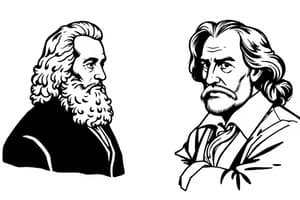Podcast
Questions and Answers
What characterizes Hobbes' view of the state of nature?
What characterizes Hobbes' view of the state of nature?
- A fundamental conflict driven by self-interest (correct)
- A society where natural laws dictate ethical behavior
- A realm of inherent cooperation and moral guidance
- A peaceful coexistence prioritizing individual rights
In Locke's perspective, what do individuals possess in the state of nature?
In Locke's perspective, what do individuals possess in the state of nature?
- A guarantee of peace and conflict resolution
- Natural rights to life, liberty, and property (correct)
- The right to unlimited power over one another
- No rights until given by the government
Which of the following statements reflects Hobbes' view on morality?
Which of the following statements reflects Hobbes' view on morality?
- Morality is derived from natural laws binding all individuals
- Morality exists but is ignored in times of conflict
- Morality is based on societal norms rather than individual interests
- Morality is non-existent in the state of nature (correct)
What is a key difference between Hobbes and Locke's views on human nature?
What is a key difference between Hobbes and Locke's views on human nature?
How does Locke propose conflicts should be resolved in the state of nature?
How does Locke propose conflicts should be resolved in the state of nature?
What role does Hobbes believe government should play in society?
What role does Hobbes believe government should play in society?
According to Locke, where do inherent rights originate?
According to Locke, where do inherent rights originate?
What is Hobbes' view on the significance of a governing authority?
What is Hobbes' view on the significance of a governing authority?
Flashcards
Hobbes' State of Nature
Hobbes' State of Nature
A hypothetical state where there is no government or social order, leading to chaos and constant conflict. Individuals are driven by self-preservation and power, and morality is absent.
Locke's Natural Rights
Locke's Natural Rights
Natural laws that dictate inherent rights to life, liberty, and property, which exist even without a formal government.
War of All Against All
War of All Against All
In Hobbes' vision, the constant struggle for survival and power in the state of nature, where everyone is against everyone else.
Self Enforcement of Rights in Locke's State of Nature
Self Enforcement of Rights in Locke's State of Nature
Signup and view all the flashcards
Hobbes' View of Human Nature
Hobbes' View of Human Nature
Signup and view all the flashcards
Locke's View of Human Nature
Locke's View of Human Nature
Signup and view all the flashcards
Hobbes' Role of Government
Hobbes' Role of Government
Signup and view all the flashcards
Locke's Role of Government
Locke's Role of Government
Signup and view all the flashcards
Study Notes
Hobbes' State of Nature
- Hobbes envisioned a bleak and brutal "state of nature" characterized by constant conflict and fear.
- Individuals are driven by self-interest and a relentless pursuit of power.
- The absence of a central authority leads to a "war of all against all."
- Life in this state is "solitary, poor, nasty, brutish, and short."
- Key motivations are self-preservation and the insatiable desire for resources and power.
- Individuals lack moral considerations; morality is irrelevant in the absence of enforceable laws.
- Without a governing body, there are no rights or duties. The right of an individual is to do whatever is necessary to survive.
Locke's State of Nature
- Locke presented a more optimistic view of the state of nature.
- While acknowledging the absence of a formal government, he argued that natural law dictates certain inherent rights.
- Individuals possess natural rights to life, liberty, and property.
- These are not conferred by the government; they precede it.
- Individuals are capable of cooperation and reason.
- Natural law obligates individuals to respect the rights of others.
- Punishment for violations of rights occurs through self-defense if necessary. The lack of a judge means individuals are permitted to enforce their own rights.
Key Differences
- Moral Framework: Hobbes sees morality as nonexistent in the state of nature, while Locke argues natural law provides ethical guidelines.
- Individual Motivation: Hobbes emphasizes self-interest as the primary driver, while Locke highlights reason and cooperation as equally important, perhaps even more so.
- Right to Property: Hobbes doesn't explicitly address property rights in the state of nature. Locke argues that individuals have a natural right to acquire and own property through their labor.
- Conflict Resolution: Hobbes believes all conflict leads to violence and war in the state of nature, while Locke suggests reasonable resolution and appropriate self-defense are possible.
- Nature of Individuals: Hobbes sees individuals as inherently selfish and aggressive, Locke sees individuals as capable of reason, cooperation and the observance of natural law.
- Role of Government: Hobbes argues that a strong central authority is essential to escape the horrors of the state of nature. Locke suggests that government serves to protect inherent rights and maintain peace, but its power must be limited.
Studying That Suits You
Use AI to generate personalized quizzes and flashcards to suit your learning preferences.




